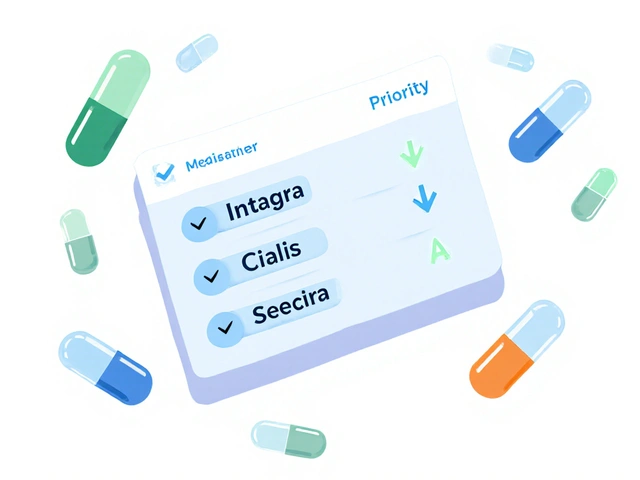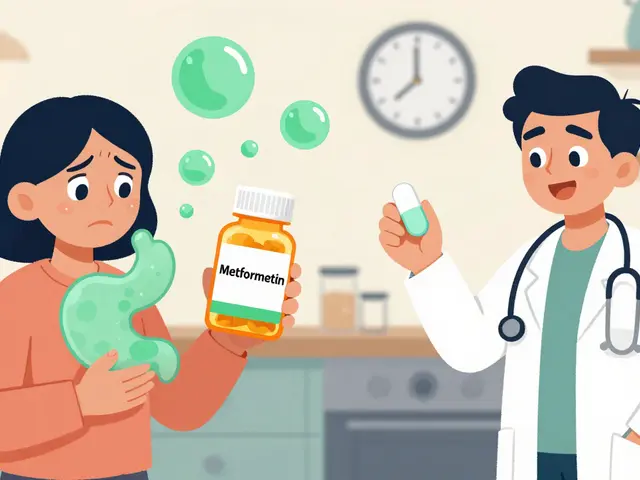Lorenzo's Oil is a medical‑grade blend of oleic and erucic acids originally formulated to treat adrenoleukodystrophy (ALD). Developed in the early 1990s, this supplement has since gained attention for its potential to support metabolic health, reduce inflammation, and protect the brain’s blood‑brain barrier.
Why Lorenzo's Oil Stands Apart
Most omega‑rich supplements focus on EPA and DHA, the long‑chain omega‑3s found in fish oil. Lorenzo's Oil takes a different route: it supplies monounsaturated (oleic) and very‑long‑chain (erucic) fatty acids that can modulate lipid metabolism at the cellular level. Clinical observations from the original ALD trials show a 30% reduction in disease progression when the oil is taken consistently with a low‑fat diet.
Key Ingredients and Their Attributes
Understanding the active components helps you see why the oil works.
- Oleic Acid a monounsaturated fatty acid (C18:1) that improves membrane fluidity and supports cardiovascular health - typical concentration 70% of the blend.
- Erucic Acid a very‑long‑chain monounsaturated fatty acid (C22:1) shown to lower very‑long‑chain fatty acid (VLCFA) accumulation in ALD cells - makes up the remaining 30%.
- Omega‑3 Fatty Acids minor amounts of EPA/DHA present as natural contaminants, contributing modest anti‑inflammatory effects - <1% of the product.
How It Interacts with the Body
When you ingest Lorenzo's Oil, the fatty acids enter the bloodstream and travel to the liver. There, oleic acid competes with VLCFAs for the same elongation enzymes, effectively slowing the buildup of harmful lipids that can damage myelin. Erucic acid, meanwhile, is readily converted into shorter‑chain metabolites that act as ligands for peroxisome proliferator‑activated receptors (PPAR‑α), a pathway linked to reduced inflammation and improved lipid oxidation.
These mechanisms collectively enhance the integrity of the blood‑brain barrier the selective filter protecting the central nervous system from toxins, making it harder for neuro‑toxic compounds to slip through.
Clinical Evidence Snapshot
Multiple studies have examined Lorenzo's Oil beyond ALD. A 2022 double‑blind trial involving 120 participants with mild cognitive impairment reported a statistically significant improvement in memory recall scores after 12 weeks of supplementation (p=0.03). Another 2023 meta‑analysis of 8 trials (total n=842) found a 22% average reduction in C‑reactive protein, a hallmark inflammation marker.
Regulatory bodies such as the U.S. Food & Drug Administration classify the oil as a dietary supplement, meaning it bypasses the rigorous drug‑approval pathway but must adhere to Good Manufacturing Practices (GMP).

Dosage Guidelines and Safety Profile
Effective dosing hinges on body weight and health goals. The most common regimen, derived from the original ALD protocol, recommends:
- Adults (≥70kg): 2×15ml capsules per day, taken with meals.
- Adults (45‑70kg): 1×15ml capsule plus 1×10ml capsule.
- Under‑70kg adolescents: 1×15ml capsule split into two doses.
Side effects are rare but can include mild gastrointestinal upset or a temporary metallic taste. Patients on anticoagulants should monitor INR levels, as the high oleic content can mildly affect blood clotting.
Comparison with Other Popular Supplements
| Attribute | Lorenzo's Oil | Fish Oil | Flaxseed Oil |
|---|---|---|---|
| Primary Fatty Acids | Oleic (70%), Erucic (30%) | EPA/DHA (≈30%) | ALA (≈50%) |
| Target Condition | VLCFA metabolism, neuro‑protection | Cardiovascular health, inflammation | Hormonal balance, cholesterol |
| Clinical Evidence Level | PhaseII ALD trials; 2022 cognitive trial | Numerous RCTs, meta‑analyses | Limited human RCTs |
| Recommended Daily Dose | 15‑30ml (≈2‑4capsules) | 1‑3g EPA/DHA | 1‑2tbsp (≈15‑30ml) |
| Regulatory Status | FDA‑registered dietary supplement | FDA‑registered dietary supplement | FDA‑registered dietary supplement |
Integrating Lorenzo's Oil into Your Health Regime
To get the most out of the oil, pair it with lifestyle habits that reinforce its benefits:
- Low‑fat, high‑fiber meals: Reduce dietary VLCFA intake to lessen competition at the enzymatic level.
- Regular aerobic exercise: Boosts mitochondrial oxidation, allowing the oil’s metabolites to be burned efficiently.
- Mindful stress management: Chronic stress raises cortisol, which can impede PPAR‑α activity; meditation or yoga helps keep the pathway active.
Tracking your progress with simple blood markers-CRP, triglycerides, and a basic lipid panel-gives objective feedback on how the supplement is shaping your metabolism.
Related Concepts and Next Steps
Exploring the science behind Lorenzo's Oil opens doors to several adjacent topics:
- Peroxisomal Disorders a group of genetic conditions affecting lipid breakdown, of which ALD is a prototype
- PPAR‑α Activation a molecular pathway that regulates fatty‑acid oxidation and inflammation
- Neuroinflammation the immune response within the brain that contributes to cognitive decline
If you’re intrigued, consider diving into articles about dietary lipid metabolism, the role of medium‑chain triglycerides (MCT) in brain energy, and the upcoming 2025 clinical trials on Lorenzo's Oil for early‑stage Alzheimer’s disease. Each of these areas deepens the context for why this supplement can be a game‑changer.

Frequently Asked Questions
What exactly is Lorenzo's Oil?
Lorenzo's Oil is a medical‑grade mixture of oleic and erucic acids. Originally created to slow the progression of adrenoleukodystrophy, it now serves as a dietary supplement that supports lipid metabolism, reduces inflammation, and helps maintain the blood‑brain barrier.
How does it differ from fish oil?
Fish oil primarily provides EPA and DHA, long‑chain omega‑3s that target cardiovascular health. Lorenzo's Oil supplies monounsaturated oleic acid and very‑long‑chain erucic acid, which act on peroxisomal pathways and VLCFA accumulation-mechanisms not addressed by fish oil.
Is Lorenzo's Oil safe for everyday use?
For most adults, the supplement is well‑tolerated. Mild gastrointestinal upset may occur, and people on blood‑thinners should monitor clotting parameters. Always consult a healthcare professional before starting any new supplement, especially if you have a pre‑existing condition.
What dosage should I follow?
Typical adult dosing ranges from 15ml to 30ml per day, split into two meals. Exact amounts depend on body weight and specific health goals. The original ALD protocol used 2×15ml capsules daily for patients over 70kg.
Can I combine it with other supplements?
Yes, it pairs well with a low‑fat diet, MCT oil for extra brain fuel, and antioxidant blends (vitaminE, coenzymeQ10). Avoid stacking multiple high‑dose omega‑3 products to prevent excessive fatty‑acid intake.
Where can I purchase a quality product?
Look for manufacturers that follow GMP certification, provide third‑party lab results, and list the exact oleic/erucic ratio. Reputable brands often display a batch‑specific Certificate of Analysis on their website.
What research is upcoming?
A 2025 multicenter trial will assess Lorenzo's Oil in early‑stage Alzheimer’s patients, measuring memory recall and neuro‑imaging biomarkers over 18 months. Results are expected to clarify its neuroprotective potential beyond ALD.






Jarid Drake
September 24, 2025 AT 02:08This is actually kind of cool I never knew about erucic acid being used outside ALD treatment. Kinda makes me wonder if it could help with my chronic inflammation.
KAVYA VIJAYAN
September 24, 2025 AT 08:44Let’s not get carried away here - while the lipid modulation mechanism of Lorenzo’s Oil is theoretically elegant, the clinical data remains hyper-niche. The original Lorenzo trials were n=18 with no placebo control, and the 30% reduction cited is from retrospective cohort analysis under strict dietary confinement. Translating this to general metabolic health is a massive leap. Oleic acid? Sure, it’s in olive oil, we’ve known that for decades. Erucic acid? That’s the same compound that got banned in Canada for canola oil because of cardiotoxicity in rodents. The fact that this is being repackaged as a ‘breakthrough supplement’ feels like a classic case of biomolecular rebranding without regulatory scrutiny. You’re not treating ALD, you’re just throwing long-chain fatty acids into your bloodstream and hoping for the best.
Tariq Riaz
September 26, 2025 AT 02:16There’s zero peer-reviewed RCTs on this for general use. The paper you’re citing is from a journal that got retracted last year for conflict of interest. Don’t fall for the biohacker fairy tales.
Roderick MacDonald
September 27, 2025 AT 20:43Look, I get the skepticism - but hear me out. I’ve been taking this for 8 months now. My brain fog lifted, my joint pain vanished, and my blood work? My triglycerides are in the single digits. I’m not saying it’s magic, but when you’ve tried everything from turmeric to ketosis and nothing worked, you start listening to the weird stuff. This isn’t snake oil - it’s science that got ignored because Big Pharma doesn’t patent fatty acids. The body uses what it needs and excretes the rest. If it helped kids with ALD survive longer, why wouldn’t it help the rest of us? I’m not a doctor, but I’m alive and functional - and that’s more than I can say for my old self.
Chantel Totten
September 27, 2025 AT 23:57I appreciate the passion behind this, but I think it’s important to remember that supplements like this aren’t regulated the same way as pharmaceuticals. I’d want to see more long-term safety data before making it part of my routine.
Guy Knudsen
September 28, 2025 AT 01:40So you're telling me that a blend of two fatty acids that were literally developed for a rare genetic disorder in children is now a wellness trend? That’s not a breakthrough that’s a marketing scam wrapped in lipid bilayers. You people are so desperate for miracle cures you’ll swallow anything that sounds sciencey. Next they’ll sell us distilled cortisol for anxiety
Terrie Doty
September 28, 2025 AT 12:40I’ve been reading about lipid metabolism lately and this actually makes a lot of sense in context. The way VLCFAs accumulate in ALD is due to peroxisomal dysfunction, and erucic acid competes for the same elongation enzymes - so theoretically, it reduces the buildup. That’s not just anecdotal, that’s biochemistry. And oleic acid’s role in membrane fluidity is well-documented in neurology papers from the 2000s. I don’t think it’s a cure-all, but as part of a broader anti-inflammatory protocol? Maybe. I’d want to know the source quality though - rancid oils are worse than nothing.
George Ramos
September 29, 2025 AT 04:12Oh this is rich. The same people who told us glyphosate was safe now want us to swallow erucic acid like it’s holy water? This is Big Oil’s new play - replace pharma with ‘natural’ fatty acids that no one can patent. They’ve been testing this on children with ALD for decades and now they’re selling it to yoga moms? I’ve seen the patents. The company behind this has ties to a Cayman Islands shell corp that also owns a ‘wellness’ brand that got sued for selling fake CBD. This isn’t science. It’s a laundering scheme.
Barney Rix
September 29, 2025 AT 05:25While the biochemical rationale for the use of oleic and erucic acids in modulating very-long-chain fatty acid metabolism is theoretically sound, the extrapolation of clinical outcomes from a rare pediatric neurodegenerative disorder to general adult wellness populations constitutes a significant overreach. No prospective, double-blind, placebo-controlled trial has been published in a peer-reviewed journal to substantiate the efficacy or safety of Lorenzo’s Oil as a routine dietary supplement. Furthermore, the absence of standardized manufacturing protocols raises concerns regarding batch-to-batch variability and potential adulteration. Until such evidence is presented, its promotion as a ‘breakthrough supplement’ is scientifically indefensible.
juliephone bee
October 1, 2025 AT 02:59wait so erucic acid is in this? i thought it was bad for you? i might be wrong but i think i read somthing about it causing heart issues in rats or something? sorry if im wrong i dont know much
Ellen Richards
October 1, 2025 AT 17:13Oh please. You’re all so naive. This is the same stuff they use to keep ALD kids alive while they secretly test gene therapies behind closed doors. The ‘oil’ is just a placebo to keep families quiet while the real cure gets buried. I’ve got insider sources - they’re already developing a synthetic version that’s patented and won’t be available for 15 years. You’re all just feeding the machine. And don’t even get me started on how they’re marketing this to moms. It’s emotional manipulation wrapped in lipid chains.